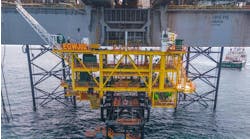The United States' paradoxical relationship with energy continues: government policy encourages the increased use of energy while discouraging energy exploration and production at nearly every turn. Advocates in the environmental community quickly learned that it is easier to save the earth by vilifying energy producers than by criticizing energy users or energy policy. As Mark Twain once wrote, "To be good is noble; but to show others how to be good is nobler, and no trouble at all."
Political arithmetic provides little incentive for elected officials to curb energy demand, but exerts strong pressure to curb production activities. As a result, slight market fluctuations cause prices to soar and energy reliability and economic growth to be compromised.
Our status is as follows: despite major contributions to the nation's energy supply and economy, less than 20% of the US outer continental shelf (OCS) is open to energy exploration. Although OCS production now accounts for approximately 30% of US oil production, opening promising new OCS lands to development remains politically explosive – as do commissioning new LNG terminals, nuclear power plants, and even wind farms.
In many ways, unsettling images of fouled wildlife broadcast around the world in the aftermath of the 1969 Santa Barbara oil spill still define the offshore energy debate three decades after the fact. Offshore energy is seldom discussed without mention of the "serious threat" it poses to pristine beaches and wildlife. But the facts don't support this image of the industry as a polluter. The National Research Council recently found that less than 2% of all petroleum entering the marine environment comes from offshore energy development (including pipelines). And the US Coast Guard has shown that although 6.3 Bbbl of oil were produced in federal waters between 1985 and 2000, less than 0.001% was spilled – a 99.999% record for clean operations!
By far, the largest human-related source of oil in the sea is municipal waste and urban runoff, which account for approximately 22% of the oil in the sea. Different government policies might change that fact, but attempting to change voter behavior doesn't sell politically.
Meanwhile, US natural gas production is in jeopardy. Analysts at Simmons & Co. point out that US natural gas production is flagging slightly, even though the rig count has risen 9% per year since 2001. They also note that the rig count will have to rise by an additional 5-10% per annum just to keep natural gas production flat.
Yet, even in the face of such troubling statistics, the major presidential contenders recently launched into a public bout of mudslinging, trying to outdo one another in their proclaimed aversion to developing natural gas reserves from the Eastern Gulf of Mexico.
Increased reliance on foreign energy exports thousands of jobs and billions in revenues overseas — frequently to countries that support activities against the interests of the free world. Furthermore, while new technologies have enhanced tanker safety, there is no doubt that supplies imported by tanker are less secure than domestically produced hydrocarbons transported via pipeline.
Energy development and environmental quality are not mutually exclusive, particularly in the US, where the most advanced technology, an educated workforce, and an enlightened regulatory regime combine to foster the world's cleanest energy production. However, until the general public is educated on these issues or undergoes significant economic pain from an energy crisis, politicians will remain unwilling to look beyond the next election.
The polarized political debate has left the country with an "all-or-nothing" environmental ethic that has little room for sound resource management. Instead of examining which areas are appropriate for energy development, we have blanketed more than 80% of the OCS with moratoria on development. Some of these off-limits regions are surely compatible with energy development, others perhaps less so. In any case, there is little accommodation for reason in today's zero-sum game political climate despite obvious reasons to be concerned about future energy supplies.
The US offshore industry has achieved an outstanding record of environmental performance. We need to ensure that when voters make choices on energy, they understand the true consequences of their choices. Our country must come to understand that without a fundamental change in our energy policy, we will no longer be able to afford the technological advances that have propelled our economy and improved our quality of life for the last several decades.
Jon Marshall
President and CEO GlobalSantaFe
This page reflects viewpoints on the political, economic, cultural, technological, and environmental issues that shape the future of the petroleum industry. Offshore Magazine invites you to share your thoughts. Email your Beyond the Horizon manuscript to Eldon Ball at [email protected].


